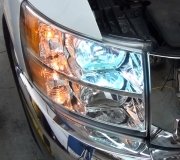Hi athlete1012. Welcome back to the forum. Your description fits all of the things you mentioned, but with conditions. The most common cause of locked up brakes is a stuck caliper, especially after having a normal brake job. As the pads wear down, the piston that applies pressure to them moves out of the caliper housing a little. That is the self-adjusting feature that keeps the brake pedal nice and high and solid. As it moves out, more of it is exposed beyond the seal that holds the brake fluid in. It is still covered by a dust boot that often lets dirt and moisture in. To fit the new thicker pads in during replacement, the piston has to be pressed back into the housing all the way. Very often dirt or rust builds up on the exposed part of the piston and that junk catches on the seal. You can force the piston out to apply the brakes with the pedal, but the seal will not let the piston retract a little to release pressure so they stay applied. As the heat builds up, the piston expands and applies the pads even harder so more heat builds up and the brakes drag even worse.
So calipers are a common cause, but it is not common to have both front ones locking up at the same time. It IS possible, especially after service, like I mentioned, but not common. When both brakes are affected a few weeks after service work was done, I worry more about the brake fluid being contaminated with petroleum product such as engine oil, power steering fluid, or transmission fluid. Rubber brake parts are not compatible with petroleum products. The rubber seals in the master cylinder wll swell and grow past the fluid return ports. That will trap pressurized fluid just as though you were driving with your foot on the brake pedal. The same heat buildup will occur, but now the trapped fluid in the calipers will heat up and expand, applying the brakes even harder. The clue here is to remove a cap from the master cylinder and look at the rubber bladder seal under it. With CLEAN fingers, you should be able to push it back into the cap where it will "pop" back into position if it had been pulled down. If it is soft and mushy and expanded too large to fit in the cap, the fluid is contaminated. That will run into real big bucks to repair. It is likely the fluid was contaminated during the recent service work. Take the vehicle back to that shop and explain what you found. It may be hard to prove, but if their mechanic caused the contamination, they should do the repairs for free. The only proper repair is to replace EVERY rubber part that contacts brake fluid, and to flush and dry all of the steel lines, then refill the system with new, clean brake fluid.
Brake hoses can trap brake fluid too, but that isn't likely the cause on your car because it is rather rare and even less likely to cause two brakes to lock up at the same time.
The master cylinder can cause multiple brakes to lock up but it will not happen on its own. The previously-mention fluid contamination will require replacement of the master cylinder along with all other parts that have rubber seals or parts inside, but a misadjusted pushrod can also cause the brakes to stay applied, again, just as though you were holding the pedal down. Some pushrods are not adjustable, and those that are do not get out of adjustment on their own. The master cylinder must be physically removed to access the pushrod.
The same thing can happen if the brake light switch is out of adjustment. When the brakes lock up again, pull the brake pedal up with your toes. If they release, check the switch to see if it is holding the pedal down a little.
Caradiodoc
Tuesday, June 1st, 2010 AT 3:06 PM


